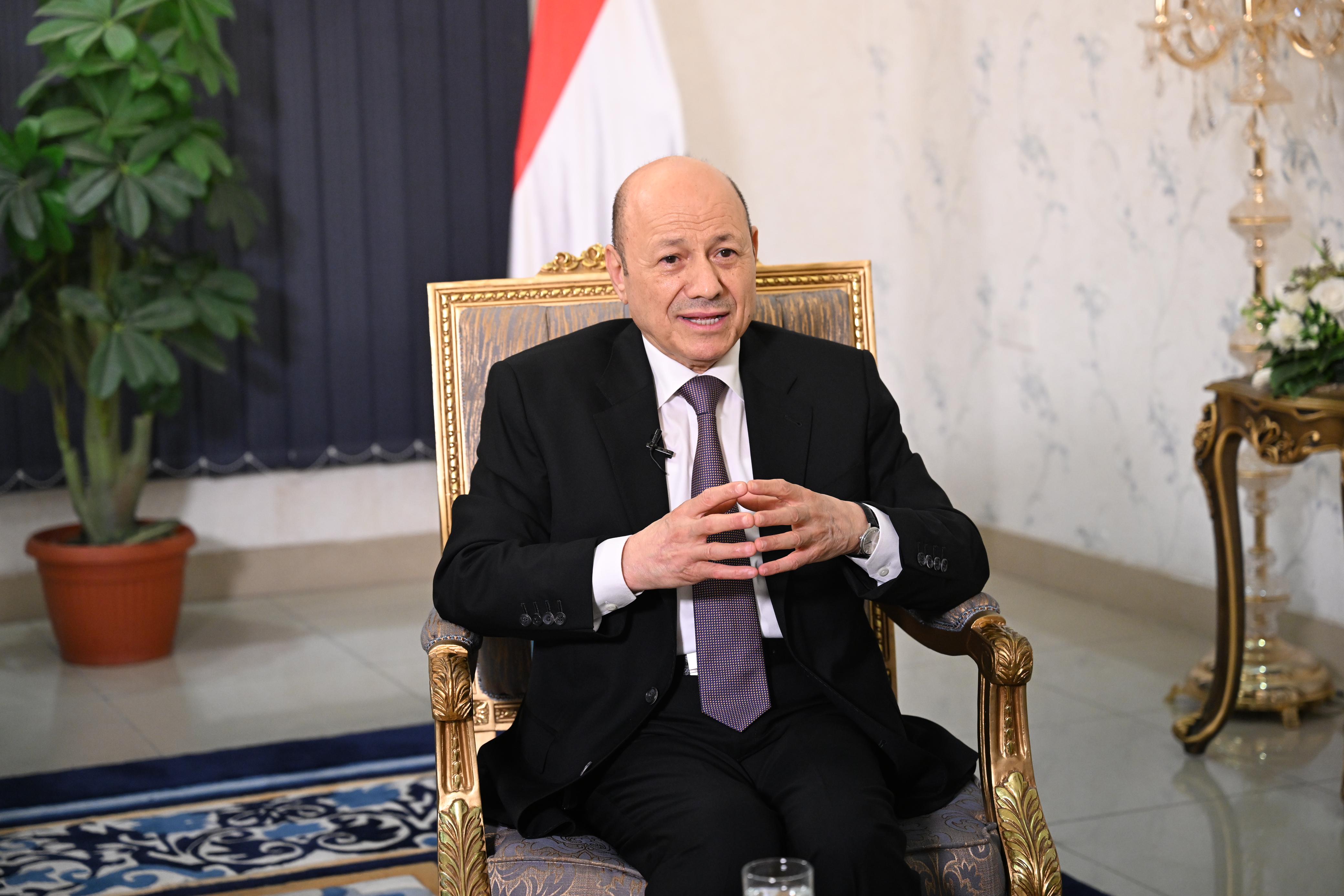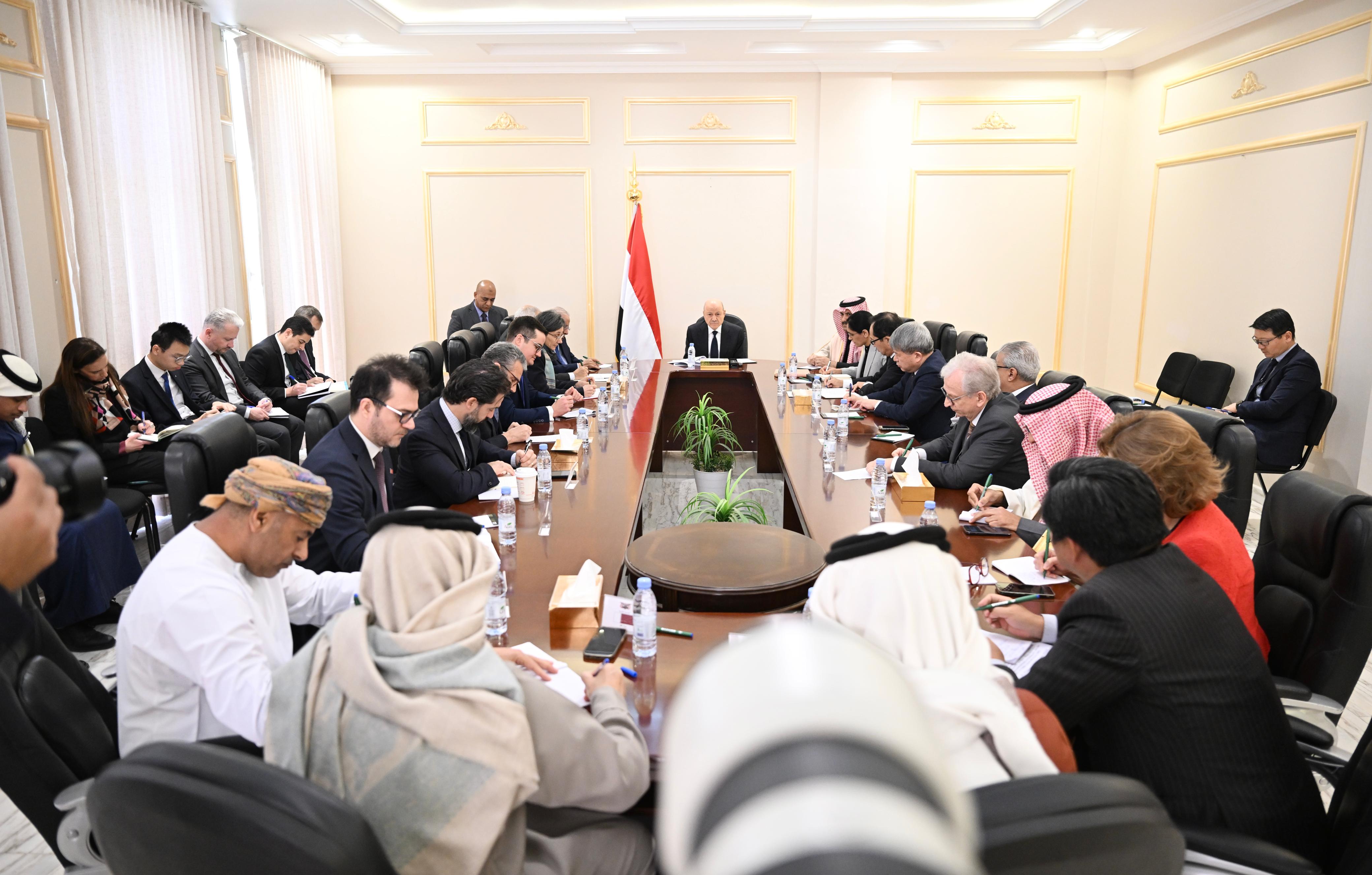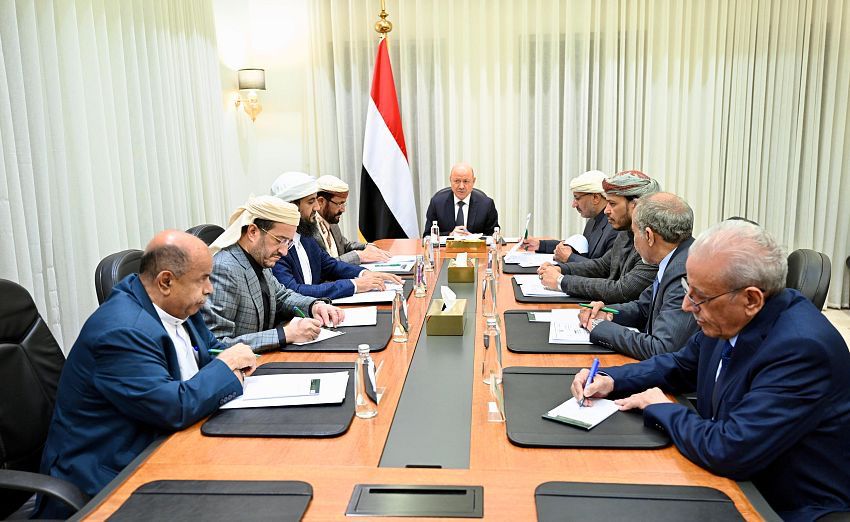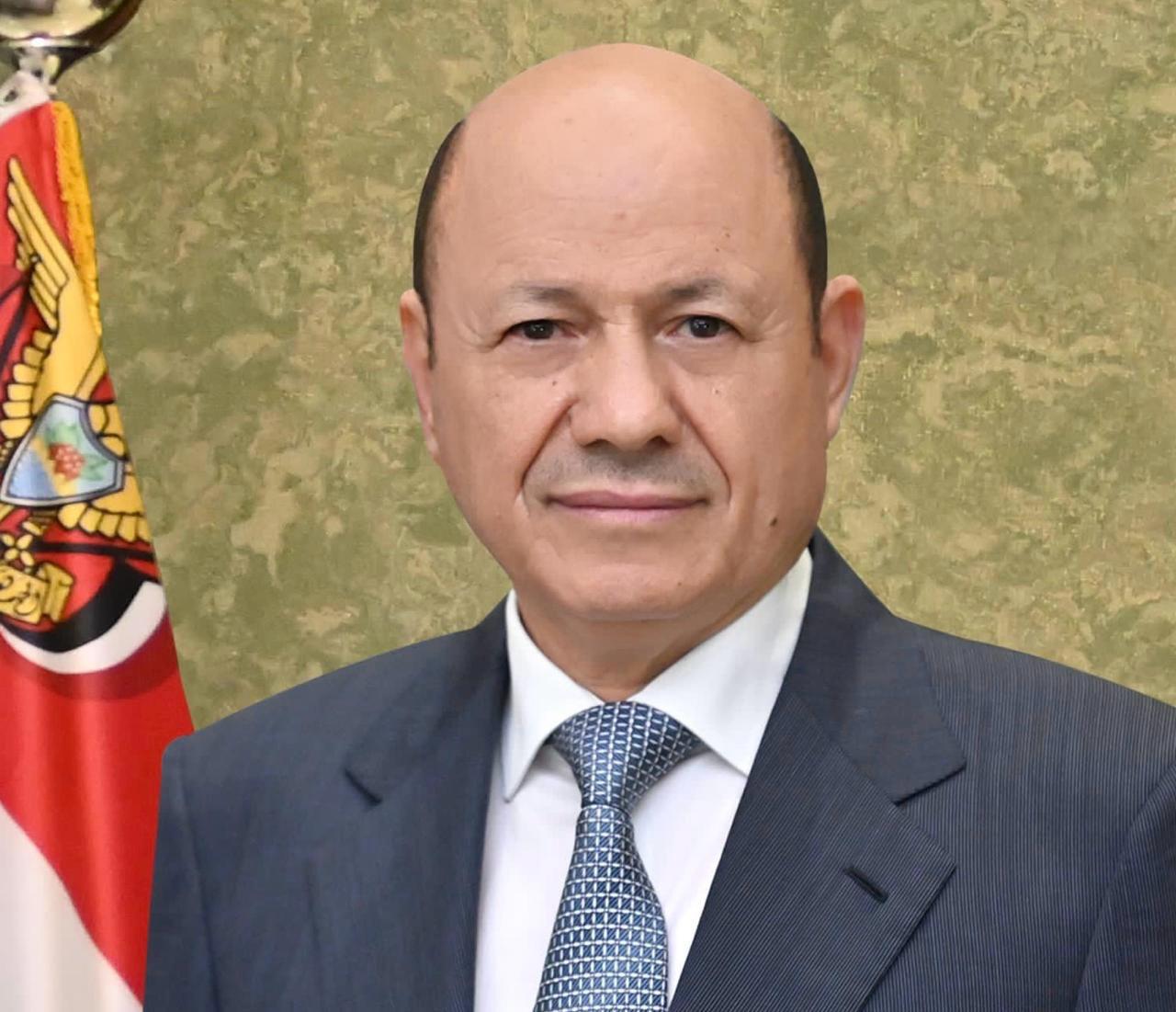
The President: Houthi militias and their allies are waving “Gaza’s bloody shirt” to serve Iranian interests and agenda
Aden
His Excellency President Dr. Rashad Mohammed Al-Alimi, President of the Presidential Leadership Council, confirmed that the Houthi militias and their allies are waving the “Gaza’s bloody shirt” to serve Iranian interests and agenda at the expense of the interests of the Arab peoples. His Excellency stressed that the struggles of the Yemenis will not stop confronting this destructive project in the region.
In an interview with a group of Egyptian journalists on the (TEN) channel, the President of the Presidential Leadership Council recalled the history of struggle and continuous resistance against the Imamate project that succeeded in the establishment of the Republic, after the September 26 Revolution. The Revolution which represented a historic turning point in the lives of Yemenis, because it changed the tyrannical regime, entire Yemen, and brought about radical changes at all levels.
He considered that the September 26 Revolution represented a qualitative leap by providing Yemenis with the opportunity to establish a republican system, achieve justice, equality, national unity, establish balanced relations with the Arab region and the world, eliminate differences between classes, and achieve comprehensive economic and educational development. He pointed out that the Houthi movement began at Sa’ada in 1983 and not in 2004, as some believe, coinciding with the emergence of Hezbollah in Lebanon.
He said, "Therefore, since then, there has been an Iranian plan to establish militias that serve the goals of the Iranian project in the region, which is the chaos project under the false title of exporting the revolution and bringing justice to the oppressed."
He explained that since its inception in the 1980s, the Houthi militias began carrying out terrorist acts, then formed what they called the “Faithful Youth”, then mobilized their members and supplied them with weapons and money from Iran and began confronting the state in 2004.
The President of the Presidential Leadership Council pointed out to the Houthis’ political project, saying, “They have two main principles. The first principle is that authority is confined to “Al al-Bayt”, the Hashimate density and that all rulers, whether in Yemen or in the Arab region, are usurpers of this authority.” Pointing out that this principle is the ideological element in their political project.
He pointed out that the second principle that Iran supported was that their interest in restoring the idea of the Imam in Yemen coincided with an Iranian interest in exporting chaos to the region, expansion and control. stressing that from this standpoint the marriage between two ideas began, the idea of the Imamate that these families want to revive in Yemen, and the idea of expanding and exporting the revolution that Iran is adopting to control the region through these militias.
In this context, he pointed out that the militias exploited what was known as the Arab Spring and the subsequent arrangements for the political transition phase. In order to overthrow the state and the outcomes of the National Dialogue Conference called for by the Gulf Initiative, in which the Houthis participated with about 36 members, leading to their participation in preparing the draft of the new constitution of Yemen.
He continued, "At the time when we were scheduled to meet with the president to form a committee to develop a mechanism for a referendum and refer the draft constitution to the House of Representatives, the Houthi militias kidnapped the director of the Office of the Presidency of the Republic. Because they believed that he had the only copy of the constitution draft, while there was another copy. Then President Abd Rabbuh Mansour Hadi attended the meeting, and announced that the draft would be referred to the committee for supervising and following up on the outcomes of the dialogue, then to the House of Representatives, and then to a popular referendum”.
He explained that after all this work, the Houthis carried out a coup against the national consensus. They took control of the presidential palace, besieged the president, killed a number of his family members and his guards, besieged the prime minister and the ministers, seized power by force, and spread throughout all the governorates. They were not satisfied with this, but they attacked Ma’ashik presidential palace by drones.
He pointed out that with this action, Iran achieved its goals by eliminating the Gulf Initiative, its executive mechanism, the outcomes of the national dialogue, and brought Yemen into the dark tunnel of conflict and war that continues to this day.
He noted the role of “Decisive Storm” in helping Yemenis resist this project and recover 80 percent of the country’s territories, with the help of its people and with the support of the coalition to support legitimacy, based on the request of the legitimate government in accordance with the United Nations Charter and the joint defense agreements in the Arab League. He stressed that “Decisive Storm” protected the remaining of the Yemeni state and revived hope among the Yemenis that there is a state called the Republic of Yemen. The State which
is internationally recognized in addition to citizenship rights, as the Yemeni citizen today has embassies everywhere in the world and can obtain a passport and feel that there is a state that protects him at home and abroad.
He said, "Decisive Storm” was a response to the aspirations of Yemenis, not only at the level of protecting the national state, but also their requirements and life needs."
His Excellency the President stressed that Iran is using Arab fair issues for unjust and immoral purposes, including destabilizing the security and stability of the Arab region. Pointing out that the Yemeni issue is one of these issues that Iran uses to achieve its interests at the expense of the interest of the Yemeni people and Arab interests in general.
He said, "We have information about how Iran exploits its militias, whether in Yemen, Syria, Iraq, or Lebanon, to achieve its interests, whether with regard to sanctions, unblocking assets, or with regard to its nuclear program, and the future of its influence in the region."
He added, "I believe that Iranian interests today are what control its militias in the region, including Yemen, and Iran's interests prevail over the interests of these peoples, which is the greatest disaster that we must all confront today."
He reiterated that there are two projects in the region: a project of destruction and chaos and a project of development and reform. He explained that the government is adopting a project of development and reform, as there are more than 3,000 development projects that have been implemented at the level of the liberated governorates. Stressing that this is what would return Yemen to its normal state.
He praised the support of our brothers in the Kingdom of Saudi Arabia and the United Arab Emirates in this field, pointing out that among those tangible projects by the Yemeni citizen is the Aden Hospital Project, whose name was changed based on the decision of the local council in Aden Governorate to Prince Mohammed bin Salman Hospital. The hospital provides health services to about half a million Yemenis from all regions, including areas under the control of militias, as well as the Hassan Dam project at the expense of the United Arab Emirates at a cost of $70 million in its first phase.
He talked about the challenges facing the government’s efforts in the service and development field, including the militias’ threat to target any development project, indicating that during the truce they attacked the oil export port in Hadhramaut with missiles. Which led to the cessation of oil exports and exacerbated the suffering of citizens, even in the regions under Houthis control, where employees have been working for more than nine years without salaries.
He said, "We wanted to re-export oil and were thinking that revenues from Hodeidah ports would be allocated in accordance with the Stockholm Agreement to employees in areas controlled by the militias. We collected 40 billion under the supervision of the United Nations at the Central Bank in Hodeidah, but the militias confiscated it under the full view of the United Nations mission in the city. The credits were confiscated to support the military fronts and mobilize fighters.”
The President of the Presidential Leadership Council also touched upon the Houthis’ crimes in planting mines, referring in this context to the Saudi “MSAM” project and the National Center for Demining, which, since 2018 until now, have been able to remove more than 500,000 mines and explosive devices that were planted with Iranian assistance and expertise. He pointed out that, in appreciation for these efforts, the two projects were honored by awarding them two of the highest medals, the Medal of Courage.
His Excellency the President predicted that there are still between one million and five hundred thousand to two million Houthi mines planted throughout the country, explaining that these mines are internationally prohibited. He added that the Yemeni government had succeeded in getting rid of all the mines planted in the country before 2011, considering that these mines are prohibited internationally and there are resolutions from the United Nations and international organizations in this regard.
He reported that the Houthis had established factories in Sa’ada with the help of Iranian experts from Hezbollah and were using fertilizer under the guise of importing it for agriculture, and manufacturing these mines in huge quantities camouflaged as stones.
He added, "Today we have thousands of victims as a result of mines planted by the Houthi militias."
Regarding the efforts of the Yemeni government to confront economic challenges, His Excellency the President confirmed that he and his fellow, members of the Presidential Leadership Council, from the first day of the formation of the Council, set self-reliance as a strategic goal, which required the Council to implement an economic and administrative reform program. Because during the past years there was weakness in the central state institutions, and local authorities.
He said, "Although we were in a battle with the Houthi militias, which is in fact a battle with Iran, we proceeded with one hand bearing arms and one hand building. We were keen to form a model in the areas under the influence of the legitimate government, to turn them into areas that attract citizens from all governorates."
In this context, he explained that the government has begun establishing and rebuilding state institutions, at the forefront of which is the institution of justice and law enforcement. By restructuring the Supreme Judicial Council, appointing the Public Prosecutor, forming prosecution offices and courts, and appointing the Chief and members of the Supreme Court.
On the security aspect, His Excellency the President said, “We began activating the security services and promoting security work in the interim capital, Aden, and the governorates’ capitals, because they were in a state of chaos.” Pointing to the continuation of efforts to build the army, as an operations room for the army and military components was formed which is managing the operations theater now under the command of the Minister of Defense.
His Excellency the President praised the support of the brothers in the Kingdom of Saudi Arabia for the state’s general budget after the cessation of oil exports, to enable the government to meet its inevitable obligations with regard to wages and salaries. As well as the support provided by the United Arab Emirates to the Central Bank and in terms of oil derivatives, in addition to the aid provided by the International Bank, and Monetary Fund, the United States, Britain, the European Union, Germany, and other brothers and friends.
He pointed out the government’s keenness, within the framework of self-reliance, to develop resources, not at the central level, but also at the governorate level. Pointing out that the government has made great strides in this aspect, as tax and customs revenues constitute 30% of inevitable spending, and 70% used to be covered by oil. This percentage is compensated today to some extent by the aid of brothers and friends, whom we consider our partners in the battle.
His Excellency the President of the Presidential Leadership Council also praised the efforts of his fellow Council members in this battle.
Regarding peace efforts, His Excellency the President affirmed the Council and the government’s commitment to this option despite the Houthi militias’ continued evasion of their commitments and their absolute refusal to implement any clause of the truce agreement and the opening of roads in the besieged city of Taiz.
He said, “We are still calling for peace because we consider it to be in the interest of all Yemenis.” He stressed that the desired peace is peace based on the restoration of state institutions, a comprehensive and just peace based on terms of reference and equal partnership, not surrender to militias. He explained that the Security Council’s Resolution 2216 is a comprehensive road map for resolving the Yemeni issue.
He added, "We are still adhering to these Resolutions and References, the Gulf Initiative, the outcomes of the National Dialogue, and the Draft Constitution that were agreed upon, because we want equal citizenship for Yemenis to be achieved."
His Excellency the President reaffirmed the government's firm and clear position towards the Palestinian issue, based on the two-state solution and the Arab Peace Initiative.
He said, "This is the official Yemeni position without manipulation," adding, "We are with our brothers in Gaza and we have weekly demonstrations in all the liberated governorates in support of our brothers in Gaza. The government has also coordinated with the Chamber of Commerce to collect donations despite our difficult circumstances."
The President of the Presidential Leadership Council confirmed that there is no relationship between the Houthi militia’s escalation in the Red Sea and its claims to support Gaza. He explained that the Houthi militias and their allies in Iraq, Lebanon and the region are using the Gaza ” bloody shirt” to serve Iranian interests and agenda, indicating that this is performed by the harmony between the activity carried out by the militias in Iraq and that carried out by them in Syria, Lebanon and Yemen, in accordance with Iran’s interests and the undeclared dialogues between it and Western society.
He added, "We know, as well as you know, that there are ongoing dialogues between the West and Iran, and it clearly presents its conditions, including lifting sanctions in exchange for stopping the escalation."
His Excellency the President stressed the importance of strengthening joint Arab cooperation and coordination to confront the external threats facing the Arab region, stressing the need for this coordination and cooperation to take different forms in all fields. He explained that Iranian policy is a long-term and patient policy, as Khamenei called it a couple of months ago the Policy of Strategic Patience pointing out that this name did not come out of vacuum.
He said, "The strategic patience announced by Khamenei must be matched by joint action from the Arab region," stressing that the Presidential Leadership Council and the government are aware of the strategic economic and political interests that govern the international community's relations with Yemen, and that countries are not charitable societies, but are governed by interests. Therefore, the Yemeni government is keen to bring about a shift in these strategies for the benefit of the region, for the benefit of Yemenis, and against sabotage and destructive projects in the region.
His Excellency the President pointed out the keenness of the Council and the government, in this context, to maintain the cohesion of the international community in the Security Council and maintain good relations with all parties.
He continued, "We do not want Yemen to enter into a conflict or be a party to any international conflicts. We have enough concerns, and therefore we are trying to achieve a kind of balance in our foreign policies in order to achieve our goals of restoring state institutions, overthrowing the coup, and achieving a comprehensive and just peace based on references."
His Excellency the President praised the Yemeni-Egyptian relationships, which he described as “deep-rooted and baptized with blood in the sixties.” He noted that the Arab Republic of Egypt embraces hundreds of thousands of Yemenis, who live there as if they were in their homeland, and are treated like their Egyptian brothers in schools and hospitals. His Excellency expressed his thanks to His Excellency President Abdel Fattah El-Sisi, the Egyptian government, and the Egyptian people for everything they provide to Yemenis seeking a safe haven from the oppression of the terrorist Houthi militias.
His Excellency the President reiterated the importance of supporting the Yemeni government to control the entire national territory in order to secure the Red Sea, saying, "The Houthi threat comes from the ground, therefore the solution is to control the Yemeni territory, coasts, and the entire Yemeni so that the threat stops."

President Al-Alimi: Developments on Ground Are Promising and Refute Claims of a Vacuum and Worst-Case Scenarios
His Excellency President Dr. Rashad Mohammed Al-Alimi, President of the Presidential Leadership Council, said that state institutions are making tangible progress in unifying security and military decision-making


